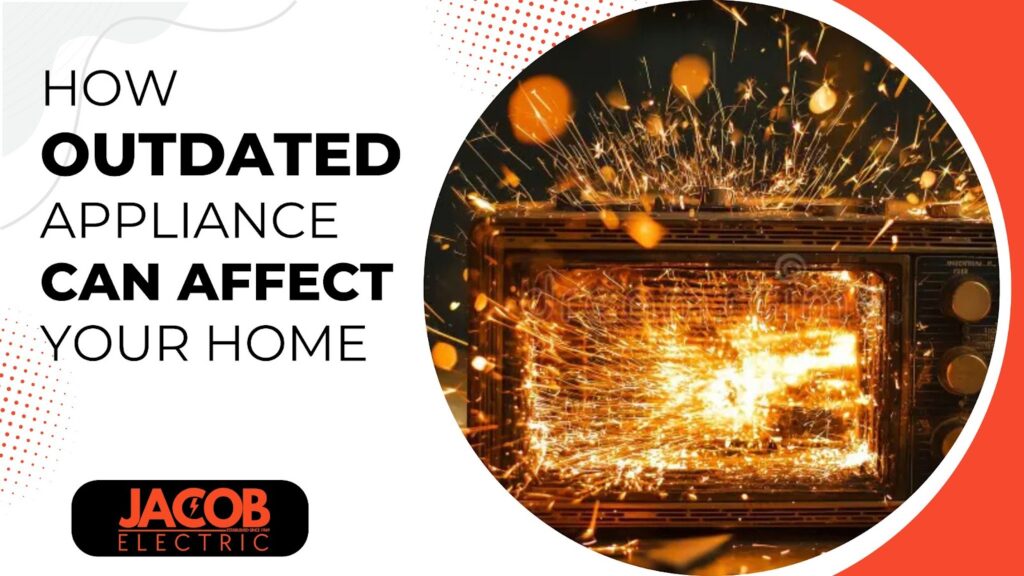Old appliances can have a significant impact on your home in various ways. Beyond creating electrical and fire hazards, they can be inefficient and drive up energy and repair costs. As appliances age, repairs may no longer be enough to restore them to working order; frequent fixes can’t compete with the benefits of newer, more advanced technology. Upgrading your appliances offers many advantages.
Is your home struggling with outdated appliances? Let’s explore the downsides of keeping old models and the advantages of upgrading them.
What Are Outdated Appliances?
An appliance becomes outdated when it exceeds its expected lifespan. At this point, it may lack modern features like safety shutoffs or smart connectivity. Common outdated appliances include refrigerators, stoves, dishwashers, microwaves, washing machines/dryers, and HVAC units.
Here are some signs your appliances might be outdated:
- Frequent Repairs: If you’re repairing the same appliance multiple times each year, the cost of labor and parts may justify a replacement.
- Higher Energy Bills: As appliances wear out, their efficiency decreases, causing them to run longer or more often, which increases utility costs.
- Noise: Increased noise levels often signal problems, suggesting that an appliance may be nearing failure.
How Outdated Appliances Impact Your Home
Old appliances aren’t just inconvenient—they can cause multiple issues. Here’s why you should consider replacing them:
Safety Risks
Outdated appliances pose significant safety hazards, including:
- Fire: Faulty wiring or overheating can lead to fires.
- Electric Shocks: Older appliances may have wiring issues that can cause electrical shocks.
- Water Damage: Leaking washing machines or dishwashers can cause water damage.
- Carbon Monoxide Leaks: Faulty gas appliances can lead to dangerous carbon monoxide exposure.
Increased Energy Costs
Old appliances are generally inefficient, leading to higher energy consumption. Replacing them with newer models—especially Energy Star-rated appliances—can save you up to 50% on energy costs. These models are designed to use less energy, cutting both your utility bills and environmental impact.
Performance Issues
As appliances age, they often perform poorly, with symptoms such as:
- Inconsistent temperatures
- Poor heating or cooling
- Malfunctioning burners or uneven cooking
- Frequent freezer defrosting
- Multiple washing cycles for dishes
New appliances, especially those with smart technology, offer improved performance and precise control.
Environmental Impact
Outdated appliances increase your carbon footprint due to their higher energy consumption. Furthermore, improper disposal of old appliances contributes to landfill waste, adding to environmental strain.
When Should You Repair or Replace an Appliance?
Sometimes, repairs can extend the life of an appliance. However, here are some factors to consider when deciding whether to repair or replace:
- Cost: If repairs cost more than 50% of the price of a new appliance, it’s more economical to replace it.
- Repair History: An appliance with frequent major repairs is likely beyond saving.
- Parts Availability: Older appliances may have hard-to-find and expensive parts, making repairs less feasible.
A Guide to Appliance Lifespan
Appliance lifespan varies by type. Here’s an overview of how long common appliances typically last:
- Refrigerators: 9 to 13 years
- Dishwashers: 9 years
- Microwave Ovens: 9 years
- Washing Machines: 5 to 15 years
- Furnaces: 15 to 25 years
- Central Air Conditioners: 7 to 15 years
Benefits of Upgrading to Modern Appliances
Upgrading your old appliances can offer significant long-term advantages:
Improved Efficiency
New appliances, particularly Energy Star-rated models, are designed to be far more efficient, saving you both energy and money. Modern washers, dryers, and dishwashers also use less water.
Enhanced Safety Features
Modern appliances come with advanced safety features, such as automatic shut-offs in case of overheating, child locks, fall and tilt sensors, and pressure release valves. Many smart appliances also provide remote control and automatic alerts, offering greater convenience.
Increased Home Value
Upgrading your appliances can increase your home’s resale value. Buyers are attracted to homes with newer, energy-efficient, and safer appliances. Smart features add appeal and make your home stand out on the market.
Tips for Choosing New Appliances
Here are some tips for selecting the right replacements for your outdated appliances:
- Look for Energy Star certification for maximum energy efficiency.
- Ensure the appliance is the right size for your home’s needs.
- Opt for smart appliances for better control and monitoring.
- Consider models with eco-friendly settings.
- Consult a professional for advice on the best options for your home.
Common Questions About Outdated Appliances
Are Old Appliances Dangerous to Keep Using?
Old appliances can pose several risks, including fire hazards, electric shocks, and poor air quality. Aging refrigerators and air conditioners may even release harmful substances like chlorofluorocarbons.
How Can I Tell if My Appliance Is Outdated?
Frequent breakdowns, repairs, and higher energy usage are key indicators. You can also check the appliance’s label for the manufacturing date or contact the manufacturer with the serial number for more details.
Can I Recycle Outdated Appliances?
You can recycle old appliances in several ways. Many options exist, such as donating the appliance to charity, trading it in, or contacting waste management services. Recycling is the most eco-friendly option as it allows for the reuse of materials like metals.
Take Action: Upgrade Your Appliances Today
Old appliances could be compromising your safety and driving up your energy costs. Don’t wait for a breakdown—take action now. If you’re unsure whether to repair or replace an appliance, consult a professional. At Express Electrical Services, our team of licensed electricians can guide you through appliance replacements and provide essential electrical upgrades.
Contact us today to schedule a consultation and make sure your home is equipped with the latest, most efficient appliances!

